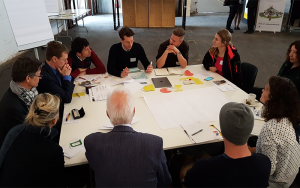Join JPI UE
Faq
FAQ
Please click here for the frequently asked questions we collected.
If you have an additional questions you are welcome to mail us at info@jpi-urbaneurope.eu
You can now access a new online report: a synthesis of the ERA-NET Cofund Smart Cities and Communities (ENSCC) call. Learn more about how the challenge of transnational cooperation for European Smart City development played out in practice, and what the call legacy means for future initiatives. You can also find out how you as a city represenative or policymaker can use the findings!
The ERA-NET Cofund Smart Cities and Communities (ENSCC) call was the first major joint call opened by JPI Urban Europe and the Smart Cities Member States Initiative in December 2014 for transnational projects produced 2016-2019. Now that the projects are completed it’s a good opportunity to review project results and to reflect on what we’ve learned from the experience of producing the call. The call aimed to engage a variety of local stakeholders in new and innovative ways and emphasized a narrative of energy efficiency that included housing, industry, heating, transportation— and not least how energy affects and is affected by people.

“Many projects started off where the need for system-wide transformation had been advocated by researchers and planners for a long time; yet few cities had managed to implement these changes…”
There was considerable emphasis on involving municipal authorities and companies, formally or informally, by testing new technologies or approaches that could be explicitly implemented in urban development initiatives and hopefully extended to other projects, contexts or even other cities. Report authors concluded that municipalities are more likely to engage in projects if the projects are well connected to local challenges, municipal strategies, and the “day-to-day” work of administration officials.
We asked the main author, Amy Rader Olsson, for report guidance:
– If I’m interested in policy recommendations on smart cities- which section should I look at?
Policy recommendations for local communities interested in smart city development can find examples of projects that supported local policymaking in section 3.4 and a discussion how to ramp up project results in section 3.5. The way you organize initiatives can also have implications for policy support outcomes. Section 4 offers insights regarding the pros and cons of supporting various forms of cooperation such as challenge-based initiatives versus a technology or method development focus.
– If I work in a city administration and want good advice- where should I look?
Those working in city administrations are often given the role of “first responders” to meeting urban challenges and they build bridges between policymakers, companies and civic organisations. Section 3 offers several examples of how to build capacity for cooperation and engaging user groups—including sections 3.7 and 3.8 that discuss the challenges and opportunities of engaging municipal authorities in research and cooperating with other user groups and stakeholders.
ENSCC consisted of 17 research- and innovation projects funded with an integrated approach to “smart city” developments, encompassing 100+ project partners from 12 different countries and 85 local- or regional authorities. The call has brought support for the development of a Positive Energy Districts program and project, as well as mobilised a commitment for stronger urban partnerships in the European partnership landscape. The Smart cities call has also paved way for a joint JPI Urban Europe call with China.
“The Commission was interested in finding an ERA-NET that could broaden member state funding for smart cities—our ambition was to become the focus point for urban related issues in Europe, a structure for other member states to join.”
–Hans-Günther Schwarz, JPI Urban Europe Governing Board